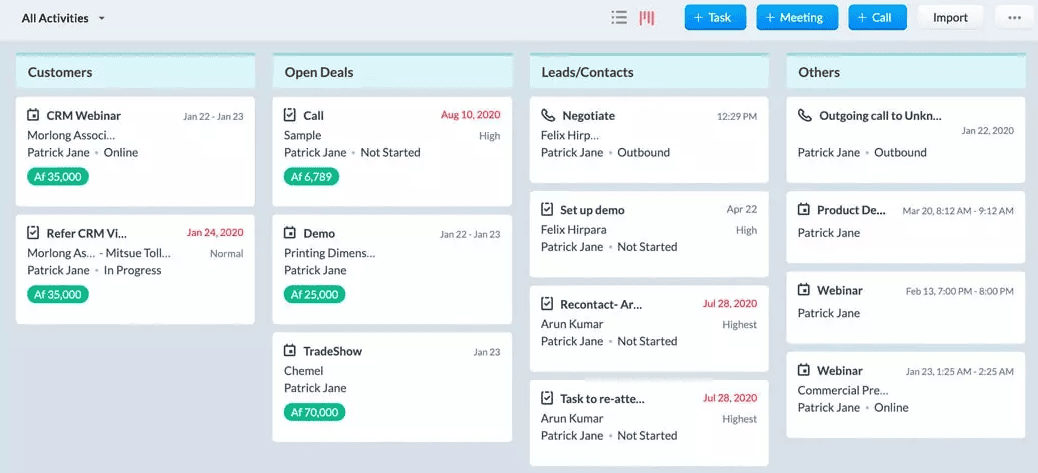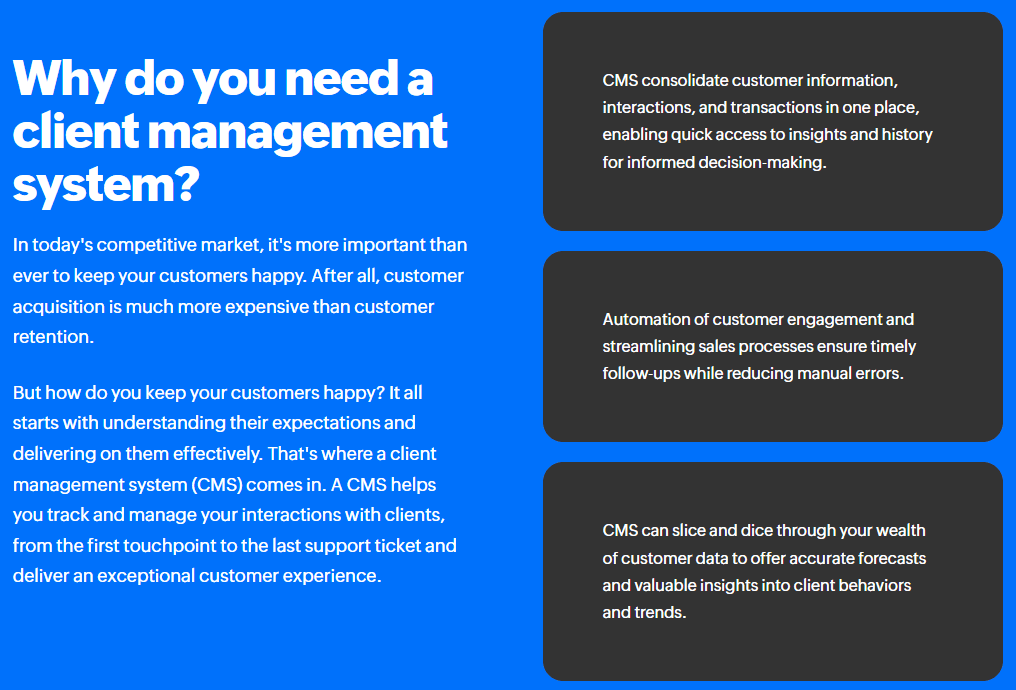Client Management Software, often synonymous with Customer Relationship Management (CRM) systems, serves as a centralized platform to manage all interactions with current and potential clients. It encompasses tools and functionalities designed to automate and synchronize sales, marketing, customer service, and technical support. The primary objective is to foster strong client relationships, enhance customer retention, and drive sales growth. When evaluating a CRM, businesses typically prioritize the following features:
a. Contact Management
A robust CRM offers comprehensive contact management capabilities, allowing businesses to store and organize client information efficiently. This includes tracking communication history, personal details, and client preferences, facilitating personalized interactions. For instance, Zoho CRM provides a 360-degree view of client profiles, enabling businesses to manage customer data effectively. Contact management is the backbone of any CRM. A robust system provides a centralized repository for all customer interactions, ensuring businesses have access to comprehensive customer data, including contact details, communication history, preferences and purchase history.
This feature enables businesses to segment customers effectively, personalize interactions, and foster stronger relationships. For instance, Zoho CRM offers a 360-degree view of client profiles, making it easier to track engagements, set follow-up reminders, and improve client retention rates. Beyond storage, a good CRM enables easy data retrieval, automatic data enrichment, and seamless data syncing across different platforms. This means that sales, marketing, and customer support teams can work with up-to-date and accurate information, eliminating data silos that often hinder operational efficiency.
b. Sales and Pipeline Management
Effective sales and pipeline management tools enable businesses to monitor prospects, track sales activities, and forecast revenue. Features such as deal tracking, sales automation, and customizable pipelines are essential. Zoho CRM, for example, offers advanced sales management tools that help businesses streamline their sales processes and close deals more efficiently. Businesses require tools that help them monitor prospects, track sales activities, and forecast revenue growth. Sales automation tools reduce manual entry, ensuring that sales representatives spend more time engaging with prospects rather than handling administrative tasks.
The Zoho CRM, for example, offers visual pipeline tracking, deal forecasting, and AI-driven insights that enhance decision-making. Effective pipeline management also ensures that businesses can track customer interactions from initial contact to deal closure. Having a well-structured pipeline helps businesses identify bottlenecks, assess the performance of their sales team, and refine their approach to improve conversion rates.
c. Marketing Automation
Integrating marketing automation allows businesses to execute targeted campaigns, manage leads, and analyze marketing performance. Automation of email marketing, social media integration, and lead nurturing are key components. Zoho CRM's marketing automation features enable businesses to create personalized campaigns and track their effectiveness seamlessly. A powerful CRM must also cater to the marketing needs of a business. Marketing automation tools help businesses execute targeted campaigns, generate leads and nurture them through the sales funnel. Features such as email automation, social media integration, and lead scoring enable businesses to streamline their marketing efforts and ensure that no lead goes cold. Zoho CRM's marketing automation capabilities allow businesses to segment their audiences based on behavior, preferences, and engagement levels. By integrating CMS with marketing platforms, businesses can ensure that their outreach is data-driven and impactful, leading to higher engagement and conversion rates.
d. Customer Support, Helpdesk and related Services
A CRM should facilitate efficient customer support through ticketing systems, knowledge bases, and real-time assistance. Providing timely and effective support enhances customer satisfaction and loyalty. Zoho Desk, integrated with Zoho CRM, offers comprehensive helpdesk solutions to manage customer inquiries and support tickets effectively. Providing excellent customer support is key to client retention and a CRM should facilitate seamless issue resolution. Features such as ticketing systems, chatbots, knowledge bases, and AI-driven recommendations empower support teams to respond promptly and effectively to customer queries.
For example, Zoho Desk, when integrated with Zoho CRM, enables businesses to streamline their support operations, track ticket histories, and provide personalized support based on customer data. The ability to offer omnichannel support ensures that customers can reach out via email, phone, chat, or social media, receiving consistent and effective assistance.
e. Analytics and Reporting
Data-driven decision-making is crucial. Advanced analytics and reporting tools provide insights into sales trends, customer behavior, and overall business performance. Zoho CRM offers customizable dashboards and reports, enabling businesses to monitor key metrics and make informed decisions. Data is the driving force behind successful business strategies. A CMS with robust analytics and reporting tools provides businesses with actionable insights into customer behavior, sales performance, and overall operational efficiency. Customizable dashboards allow businesses to monitor key performance indicators (KPIs) in real-time, ensuring informed decision-making. For instance, Zoho Analytics integrates seamlessly with Zoho CRM to offer predictive analytics, trend analysis, and performance tracking. Businesses can generate detailed reports that highlight sales trends, customer lifetime value, and churn rates, allowing them to refine their strategies for sustained growth.

f. Integration Capabilities
The ability to integrate with other business tools (e.g., email platforms, accounting software, e-commerce systems) ensures seamless data flow and operational efficiency. Zoho CRM's extensive integration capabilities allow businesses to connect with various third-party applications, enhancing overall productivity.
g. Mobile Accessibility
In an increasingly mobile world, access to client information on-the-go is vital. A CRM with a robust mobile application ensures that teams can manage client relationships anytime, anywhere. Zoho CRM offers a mobile app that provides real-time access to customer data, enabling teams to stay connected while on the move.
h. Customization and Scalability
Businesses require software that can adapt to their unique processes and scale as they grow. Customizable fields, workflows, and scalability options are essential features. Zoho CRM is highly customizable, allowing businesses to tailor the platform to their specific needs and scale as their operations expand.
The Role of Digital Solutions in Client Management
Digital solutions have revolutionized client management by automating routine tasks, enhancing data accuracy, and providing actionable insights. Companies like Erphub specialize in implementing such solutions, leveraging platforms like Zoho to offer tailored services that align with specific business needs.
a. Automation of Business Processes
Automation reduces manual intervention, minimizes errors, and frees up time for strategic activities. Erphub, as a Zoho Certified Advanced Partner, has completed over 400 automation projects, helping businesses streamline their operations effectively.
b. Enhanced Data Management
Centralized data storage ensures consistency and accessibility, enabling better decision-making and personalized client interactions. Zoho CRM's contact management features provide a unified view of customer data, facilitating informed business decisions.
c. Improved Collaboration
Digital platforms facilitate seamless collaboration among teams, ensuring that client information is accessible and up-to-date across departments. Zoho CRM's integration capabilities allow for smooth collaboration between sales, marketing, and support teams, enhancing overall efficiency.

Multi-Dimensional Approach to Selecting Client Management Software
When choosing a CRM, businesses should adopt a holistic approach, considering various dimensions:
a. Alignment with Business Objectives
The selected software should support and enhance the company's strategic goals, whether it's expanding the customer base, improving service quality, or increasing sales.
b. User Experience and Adoption
An intuitive interface and ease of use are critical for user adoption. Training and support resources further facilitate a smooth transition.
c. Cost-Benefit Analysis
Evaluating the total cost of ownership against the potential benefits, such as increased efficiency and revenue, helps in making an informed investment decision.
d. Vendor Support and Reputation
Assessing the vendor's track record, customer support quality, and ongoing development ensures long-term reliability.
Benefits of Implementing a Comprehensive Client Management Software
The advantages of investing in a well-structured CMS extend beyond just streamlining operations. Businesses that leverage advanced client management solutions experience:

Conclusion
Selecting the right Client Management Software is a strategic decision that impacts every facet of a business. With the increasing need for digital transformation, businesses must invest in solutions that offer robust contact management, sales and pipeline automation, marketing integration, customer support functionalities, and comprehensive analytics. Platforms like Zoho CRM, integrated with other Zoho applications and Erphub’s digital solutions, offer businesses an all-in-one solution that enhances efficiency, fosters growth, and ultimately drives client satisfaction.
As businesses continue to evolve, the demand for intelligent, AI-powered, and highly integrative CMS solutions will only grow. Companies that leverage these technologies will find themselves ahead of the competition, equipped with the tools necessary to build lasting customer relationships and drive sustained revenue growth. Investing in the right CMS is no longer an option—it is a necessity for businesses looking to thrive in the digital era.


